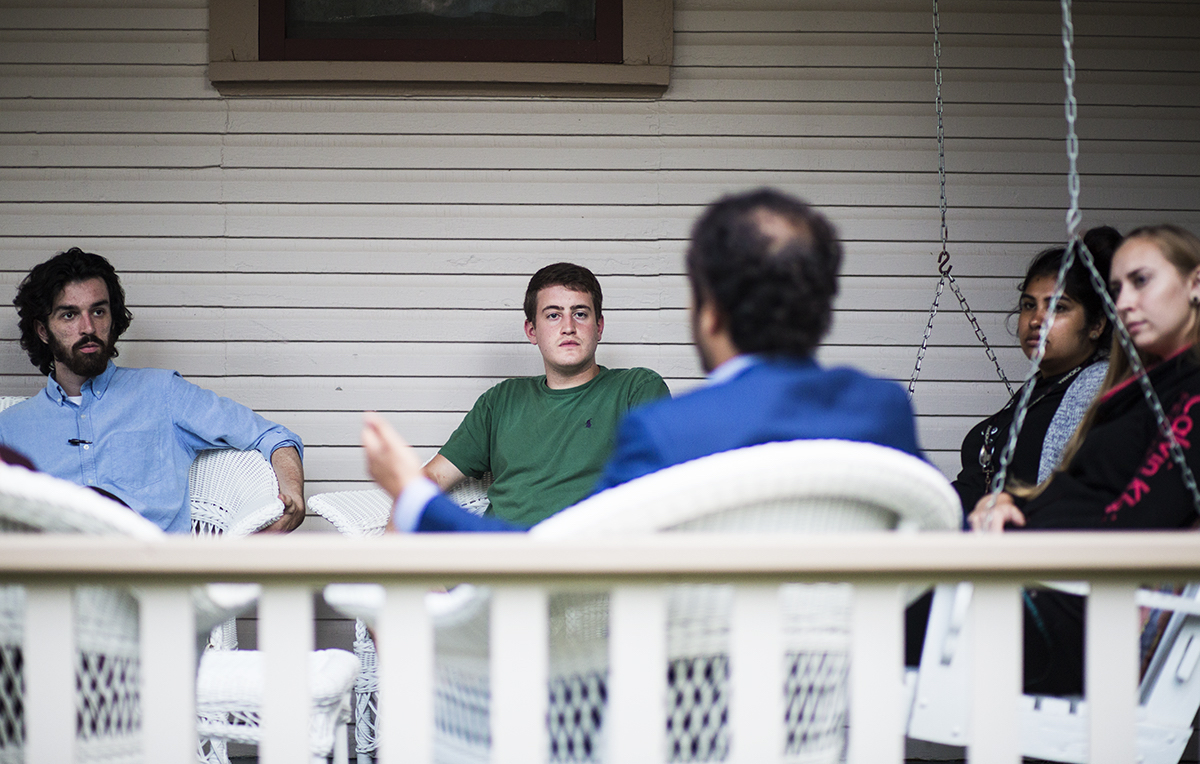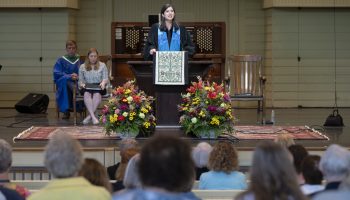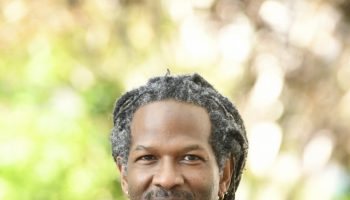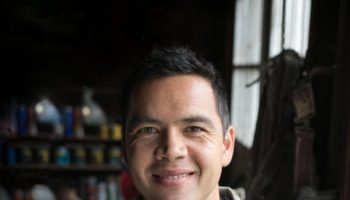When the Abrahamic Program for Young Adults coordinators were sitting at their “Ask a Jew, Christian or Muslim” table on Bestor Plaza, they anticipated questions from curious adults.
But instead, Zoë Garry, Nikhat Noorani, Omar Bayramoglu and Will Hall were approached by a child.
“You guys are all different faiths,” the child said. “Are you friends?”
When the APYA coordinators told him, yes, they were friends, he responded, “That’s so cool.”
“We have all of these little stories and little vignettes about spreading the light in that way,” Noorani, the female Muslim coordinator, said of their table conversation. “It shows that empowerment can not only be through gender equality; it can be through faith, it can be any different kind of medium. You just need to find a vehicle and someone to represent it.”
APYA, an interfaith organization that creates and leads participatory events targeted at young adults from ages 16 to 22, is that vehicle for the four coordinators. They conclude their programming at the end of Week Eight.
As their time at Chautauqua comes to a close, the group reflected on their Aug. 4 Sacred Song Service as the culmination of their work this summer.
The theme of the service was light — representing it in the world, what it means to have it inside oneself and how to share it with others. Garry, the Christian coordinator, said light is “so deeply ingrained in all of (their) traditions,” so their songs, poems and speeches reflected that.
The service not only touched people on the benches, but those on the stage as well.
“It’s one of those points where you’ve been doing everything with three other people, and you now come to realize, like, ‘Oh snap,’ ” said Bayramoglu, the male Muslim coordinator. “It felt like graduation, in a sense. … It was cool just acting a fool onstage and stuff, but at the same time, life is changing, but for the better. You’re sad to see it go, but you’re happy that it came.”
The coordinators’ prayer shawls, representing a “physical unity of (their) faiths,” Garry said, was a “tangible gift that showed (them) in one being together.”
They were pleased to present this sentiment to a wider audience, outside of their regular demographic of high school and college-aged Chautauquans. Due to the “elective” nature of their events, Hall, the Jewish coordinator, said people would not show up unless they have a desire to be there. The coordinators were happy to see their “Chautauqua connections,” friends and supporters in attendance at the Sacred Song Service.
And they’ve become acquainted with quite a few people since being here.
“You just (have) an empty seat, so you’re trying to cram into the Hall of Philosophy or to the Amp,” Garry said. “The relationships and the conversations that are naturally started that way is really beautiful. We all have one of those stories — just sitting down next to someone or passing by and saying ‘hi’ — it turns into ‘How are you?’ and ‘Who are you?’ and ‘What are you doing?’ and ‘Oh, I know this person, I know that person, let me connect you with this person.’ ”
This season, the group has not only picked up conversational friends but has also acquired special skills along the way. Noorani said post-Chautauqua, she will know how to knit, play the ukulele, navigate the stock market and ride a bike.
Each coordinator feels equipped to return to their respective seminary, rabbinical school or campus with the lessons they’ve learned. The main idea: Interfaith work works.
“I asked a question to one of the 2 p.m. (lecturers) one day, and he’s like, ‘Find people that are also willing to sit and do the same thing.’ Easier said than done,” Bayramoglu said. “But stupid me didn’t realize that it was actually happening. Where I end up in life, I know that (interfaith work) works regardless of how stubborn the other person is across the table.”
Hall said prior to the summer, he would have been hesitant to agree with Bayramoglu. But his APYA experience was something he couldn’t have studied in a book. Now that he’s seen interfaith work firsthand, he is confident in returning to Hebrew Union College with the conversational pointers and knowledge he’s gained.
“The one thing about interfaith is that when you get into conversations, you don’t know what’s going to be asked, so you have to be prepared,” Bayramoglu said. “Zoë asked me a question yesterday about doing things for the sake of the soul and for the betterment of it. I don’t know how to answer that question still.”
In going back to Hartford Seminary, Bayramoglu is self-assured because of his decision to participate in APYA.
“So far, I feel that I’ve done fairly well,” he said. “I would’ve passed the test if the test was on a piece of paper. I become more confident as a Muslim and who I am — except for Zoë’s question.”
But these metaphysical questions are at the heart of APYA’s framework.
“I’m in a Christian seminary at Princeton where there’s a lot of denominations, but we all confess to be Christians,” Garry said. “There’s a lot of internal conversations that we have and understandings of doctrine that we all adhere to, but with that, we don’t necessarily always question that dogma in the way that Will, Nikhat and Omar will question me. Having that has really helped me in having ownership of my faith.”
Hall said these queries from his APYA peers present a contrast to the deep, theological questions he receives often in rabbinical school, which are “really specific to readings and lectures.” Being at Chautauqua, though, the coordinators “have to be fluent in the basics.”
“We really like having these deep, religious conversations and conversations (with one another) that are all substance … but at home, not everybody all the time wants to talk about things like that,” Hall said. “People have long days and they’re at work, and they’re not always willing to have these long, specific conversations about these things, but here, people are really here for that. The random person you’re sitting next to in the lecture hall or the person you bump into in line, the people at the houses — for them to choose to be here for the summer definitely says something about them.”
These discussions not only inspire, but also impress, the four as well. Communication, Bayramoglu said, is the most sizable, and most valuable, task in the APYA job description.
Noorani agreed.
“Everyone has their backstory here, what I like to call the Chautauqua casual,” Noorani said. “You never know, someone might be the CEO of a huge company that you wish you could intern for, and everyone has a backstory, but they don’t want it to be known.”
And if the audience is esteemed, the speakers are equally so. Bayramoglu is known on the grounds for asking almost-daily questions to those on the Interfaith Lecture Series platform.
“It’s gotten very good responses,” he said. “I get stopped, like … ‘I can’t wait for your question tomorrow!’ For me, personally, one: It forces me to engage with what’s being talked about and how I can engage with it as a Muslim … and two: It keeps that ability to ask good questions fresh.”
After all, the lecturers are distinguished guests to Chautauqua, each one with some unique expertise to offer.
“How often are you going to meet with reverends from Pittsburgh and Ph.D. people?” Bayramoglu said. “Take advantage of it.”
And as their time wraps up, the APYA coordinators plan to take advantage of the relationships they’ve formed with one another, even if their communication changes from in-person to on-screen.
“I’m never going to talk to anyone here again — ever,” Noorani joked. “No, I don’t think (communication will) be a problem. We send each other memes all the time or articles. Zoë will draw mustaches on Will’s face and send us pictures of that.”
They have indeed become familiar with each other, so much so that Garry said they sometimes speak for one another, especially when introducing themselves.
“I know their go-to speech because I’ve heard it every time they’ve said it, you know?” she said. “For the past two months, I’ve known them. I know their interests, I know their passions.”
Imitating Bayramoglu, she said, “I’m a born-and-raised Muslim from the great state of New Jersey.”
“I’ve found that to be the sweet spot,” Bayramoglu said, defending himself.
“We get to do our first year in Israel,” Noorani joked, referencing Hall’s typical introduction.
“‘ My first year in Jerusalem,’” Garry joked. “‘Will Hall, from Houston, Texas. Texas forever.’ ”
“I don’t say that,” Hall said with a laugh.
Getting a little more serious, Hall said he was optimistic that after this summer, he will have a reference point for questions about the other Abrahamic faiths. Whereas before, he would’ve claimed not to know a “minister or pastor or imam,” he has three dependable resources now.
“We now each have at least one person from each faith that if I have a question about something, I have someone that not only can I ask, but I will trust the answer,” Hall said. “It’ll be more detailed and more personal than Googling something, and I think that’s invaluable.”
“This is my first Jewish friend,” Bayramoglu said. “I was so happy. Finally!”
“It’s an honor,” Hall said with a chuckle.
Whether they’re in New Jersey, Kansas or Ohio, APYA’s four coordinators will always be together in one way or another.
“This isn’t something you walk away from,” Garry said. “This is something that is written on your heart and is something that we’ve all been formed by.”





